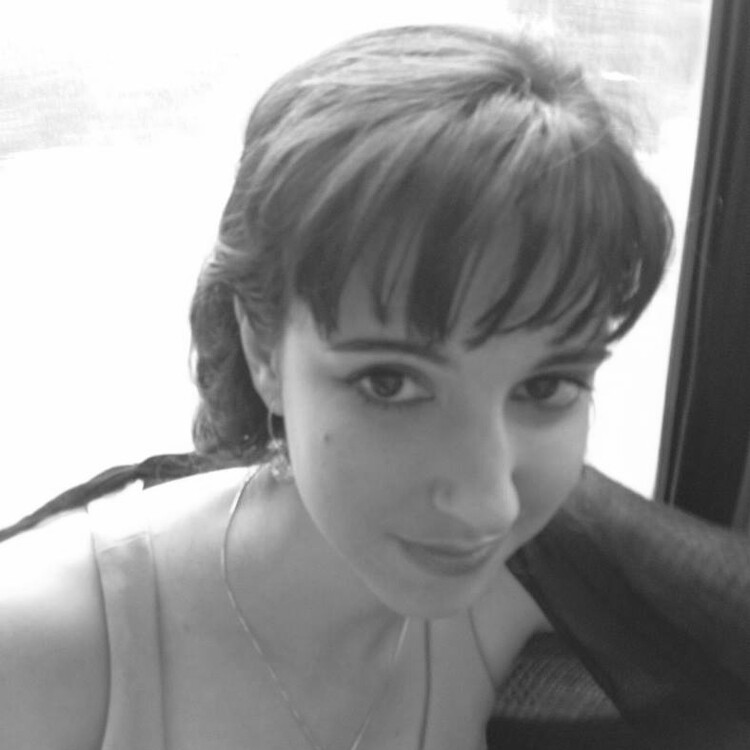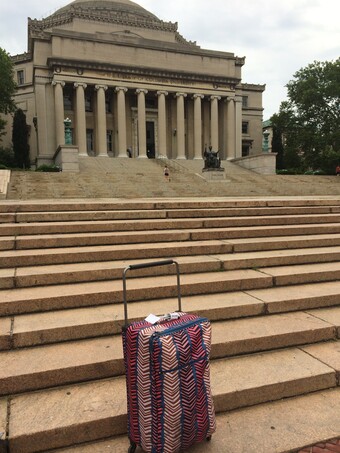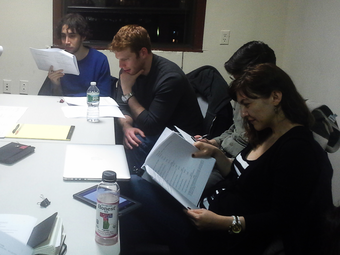Learning to Shout
In true dramaturgical fashion, I came to my first Literary Managers & Dramaturgs of the Americas (LMDA) conference prepared, poring over the conference schedule weeks in advance, scribbling questions in the margins of my notebook, even reaching out to previous attendees for advice. Out of all the insight I received in the weeks before I flew to Boston, the most valuable advice came from my undergraduate mentor and advisor: “Spend time with the young 'ins like yourself. They will be your peer group and cohort moving forward and it is important to be friendly yet competitive with them.”
I am what is known in the LMDA community as an Early Career Dramaturg, or ECD. Fresh out of college, completing a yearlong, full-time apprenticeship at a regional theater company, weighing the pros and cons of graduate school—I am Early Career in every sense. Luckily for a first-time LMDA attendee, the entire thematic frame for the conference seemed to be an open invitation for ECD input; aptly entitled “Building the Future,” this gathering was open to conversations about “creating a space for both vision and engagement in the kinds of experiences and sharing of resources that will help us create the future.” This was a giant artistic party, and my generation would be a guest of honor.
So when I walked into the main lobby for check-in, I began searching for fellow twenty-somethings—but to my surprise, ECD conversations simply happened. Although many of us had never been to an LMDA conference—some of us had never met more than a few dramaturgs in our entire lives—we were instantly drawn together by artistic and aesthetic commonalities. Our interests diverged from those of our mentors in many areas, and we relished the chance to share our opinions with each other. We talked about our visions for the future, the kind of theater that excites us, our frustrations and anxieties; we talked about our disconnect with regional theaters, interests in new play development and devised work, creating art in nontraditional performance spaces, innovative ways of reaching younger and more diverse audiences—I quickly learned that millennial dramaturgs are going to make enormous changes soon.
However, whenever the larger LMDA community gathered for plenary sessions, my otherwise question asking demographic was virtually silent. We piped in with questions during breakout sessions and smaller networking conversations, but when a panel of seasoned professionals began talking into a microphone, we hardly made a noise. It wasn’t until one brave ECD broke this trend that we even noticed it was there.
It was during the Saturday afternoon plenary session, aptly entitled “Building the Future.” The conversation covered a variety of areas, but it ultimately settled on the shifting nature of regional theater and its failure to attract wider demographics and younger audiences. As the dialogue opened up for questions, buzz words and phrases began cropping up, like “millenials,” “standing on the past,” “finding a new audience,” “tradition,” and “apprenticeship.” Seasoned professionals offered anecdotes and insight, but my generation remained almost completely silent. The only place that we voiced our opinions was Twitter, where everyone in the room, baby boomers and millenials alike, posted commentary with split-second reflexes.
Finally, an ECD raised her hand. Hers was the final question, and she prefaced it by saying, “I feel a little shy speaking out, being one of the younger people in the room…” She continued by making one of the most directly applicable statements of the afternoon, speaking for herself and her peers about what the future of theater meant from a younger perspective. But it was her disclaimer that provided the most illuminating viewpoint into our generation’s status quo.
Luckily, if somewhat ironically, we commented on this lack of ECD vocalization with astounding fervor in Tweet form, one of the most popular responses being: “I would like us to have a talk at this conference where only people under thirty are allowed to speak for one hour.”
There is some brilliance in this idea, and the message elicited volumes of positive response—but my imagination went to an interrogation room, a panel of twenty-year-olds talking on one side, and a room full of professional dramaturgs watching through a two-way mirror. LMDA has offered ECD panels in the past—just last year in fact, an ECD session included the presentation of manifestos, declarations of what we want dramaturgy to be in our future—but offering young professionals the chance to talk only alleviates part of this generational disconnect.
This plenary session hiccup is indicative of a much larger phenomenon, one that encompasses the theater community at large (after all, if any community is going to listen to its young professionals and work towards an even more inclusive environment, it’s LMDA). As someone who lives and works with fifteen other young professionals, I know that brilliant conversations are being had on both sides of the generational line—but the fact remains that there is a very definite line. It’s one that I notice beyond conference sessions. It’s evident on blogs and Facebook pages, but also in professional theater settings where we watch our mentors and supervisors steer conversations away from what our instincts are telling us.
Leaders in the field should be creating open forums and actively listening—but I want to use the rest of this blog post as a challenge for my generation.
When illuminating moments like this LMDA session occur, we cannot sit and wait for our mentors to respond with solutions; it is our obligation as emerging, smart artists to proudly invite ourselves into these conversations. I challenge my peers to learn from last year’s ECD conference attendees and declare our own manifestos for what we want our field to look like, because before we realize it, it will be ours alone. We may not feel qualified to speak about the state of regional theater in America or shifting trends in literary offices, but as the generation that will inherit this field, our perspective is invaluable.
We are in the trenches, building the future about which our mentors are debating. These sweeping, important conversations will happen with or without us, and to that end, it is our responsibility to edge our way into this dialogue, armed with the confidence that our perspective is of unique, significant, and powerful value.
Our leaders have an obligation to listen, but if they fail to do so, my generation needs to learn how to shout.









Comments
The article is just the start of the conversation—we want to know what you think about this subject, too! HowlRound is a space for knowledge-sharing, and we welcome spirited, thoughtful, and on-topic dialogue. Find our full comments policy here
Thanks everyone for so much food for thought as I start plotting and planning for #lmda15. It seems to me that Meagan's driving point of "speak up" is valid to all sorts of constituencies. I've talked about it in relationship to female playwrights. Ditto female directors. And any artist in a room with a colleague whose career dwarfs their own. We all deserve the faith in the value of our own voice that allows us to stand up and be heard. Meagan has brilliantly called to her own generation to do so. I second that. And I'll make sure to carry that mission into the next conference. But also my next staff meeting. And family dinner. I think it's about continuing the great balance of panels and panelists that our organizers have crafted over the years and making sure the less structured elements of the conference also encourage a breadth of interaction. I think LMDA excels in its support of ECDs and we'll always work to build on that. We now have an area where we can be more conscious. And I hope anyone reading this, wherever they join with others, will find this a call to mindfulness.
Beth Blickers
President- Literary Managers and Dramaturgs of the Americas
Thanks Maegan for a great post.
Magda, your points about who is formally designated by the organization as having something to contribute is important, and thanks for being focused on it this year.
Maegan, I find myself still thinking most about your points about the unstructured space of the Q&A (that often takes up at least half an hour of most LMDA panels) and whose voices we hear there. Who feels invited? Why? What influences that space? How can those of us who have been to conferences before create space for someone who may be joining us for the first time?
I'll also add for other ECDs reading this -- this post has generated a lot of discussion over on the "Early Career Dramaturg/LMDA" Facebook group (Questions have included "who should be considered early career?" "Is twitter actually redirecting dissenting voices away from the public conversation?"). If you are an ECD reading this, and you're not part of the Facebook group, please join us!
Julie, there are different models to follow, certainly. You preferred Diversity and Inclusion session to take priority this year, and considering what is happening in the field, we all agreed with this decision. As an alternative, we included ECDs on all sessions to give them platform and to make them and their work formally visible - in the room, and in inclusive manner. This arrangement also eased some of your labor as ECDs were distributed among many mentors. It also allowed them to take advantage of many new connections and diverse mentorship models. Each arrangement has advantages and disadvantages. This is something to consider next year. There is also nothing that prevents ECDs from taking leadership role and self-organizing (as they do at ATHE or ASTR), and I, and I am sure everyone else, would welcome that.
Thank you for this article, Maegan. It is profoundly important to hear from our starting artists. As an LMDA board member and the co-leader of the ECD group with Charles Haugland, I really welcome this perspective. Magda, I don't see this article as a criticism of the conference or how you organized it, per se, so much as Maegan reporting her experience of it. Her experience is valid, even if the math doesn't line up for you.
I see this essay as a call for her fellow starting artists to stand up and be heard. Yes. And more yes. And, what the hell - yes, again. Twitter is awesome, but being in the room is super-important.
For future conferences, I would love (and have said at board meetings) that I wish we had more time for the ECDs to be with just each other, and I did see the tweet Maegan references above and have been wondering what kind of unmoderated and unmitigated time the ECDs could have. The conference schedule this time did not include specific ECD time. We had a slot on Sunday at the very end of the conference that was up against the diversity/inclusion panel, which I felt was important for the next generation of theater leaders to be at. This is something I spoke about with you and the conference organizers, and I did sign off on it, although I will say I didn't see many alternatives. We had a few minutes in the bar on Thursday, but the ECDs were never assembled either with me or Charles as a group, or alone as a group. I agree with Maegan's mentor - finding your cohort is incredibly important, and that was not always easy to do at this conference, or any conference, really.
I do so very much appreciate how included the ECDs were on the panels and in discussions - but I think Maegan's encouragement for the ECDs and all starting artists not to hide behind a Twitter handle - speak up, be unafraid, and unapologetic is a great one. I echo it. I hope we all do.
Maegan, thanks so much for writing this! I love LMDA for being an organization that openly extends its arms to Early Career folks. The atmosphere at LMDA conferences has always seemed to me to be especially welcoming, not only of intergenerational and diverse voices, but also even of voices from outside of the dramaturgy profession. It's an open atmosphere. You're right: it is like a "giant artistic party" where the discussion is simply unbeatable!
I feel like what you've voiced here is an anxiety we've all felt as early career people. It is daunting to speak up in a room full of professionals that you feel are more experienced, educated, qualified than you are. But you've also taken an extra step here and encouraged all of us to be brave; to stand up, introduce ourselves, and talk about our ideas to the rest of the room, too. As ECDs, we should remind and encourage each other to speak up! We're in it together.
And p.s., thanks for the nod to last year's ECD panel and the "Future of Dramaturgy" manifestos. I was a presenter on that panel. Although I was nervous at first to be speaking on a panel at all, we ECDs ultimately had a great time doing positive, collective brainstorming about what we wanted our future to look like. That panel was also well-attended by seasoned LMDA members (including current and former presidents) who had valuable insights and ideas to add to our discussion. It was validating when some of them agreed with us (or even disagreed, but to the end of prompting further dialogue). I'm definitely in support of bringing that panel back next year, or even of having an ongoing Twitter conversation about our 'turgical hopes for the future!
Megan, if you read over the program of the conference and bios of all participants thoughtfully, you will notice that every discussion session had half and half participation rate between 'seasoned' and ECD dramaturgs. In some cases, there were more ECD and students participating in sessions than there were established people. This was done on purpose with matematical precision. You are welcome to go through the ACTUAL numbers, and as far as the numbers are concerned, this was the most inter-generationally diverse LMDA conference so far. ECD session this year was broken up into a couple of different sessions, which included a blend of younger and older participants. This was done on purpose so that ECD are fully included in each conversation. Plenary session at ALL major conferences are different: they typically showcase more established people who share their experiences with the audience. Although our plenary sessions were more like those typical at other conferences, each plenary also had some ECD people included. Young people will always be shy about speaking up - this is not a particularly revelatory statement, and part of growing up and profesionalizing is learning to find your voice. As you grow older, gain more experience, and have more things to talk about, you speak more. These are things as old as the world. But if you want to talk about the LMDA conference showcasing and giving platform to young people, please, do your research first.